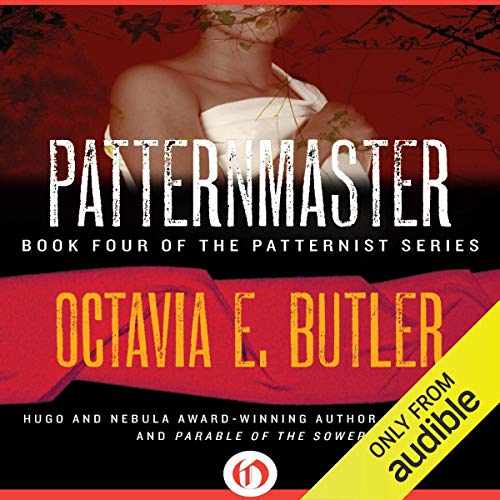![]() Patternmaster by Octavia Butler
Patternmaster by Octavia Butler
 Patternmaster (1976) was written first in Octavia Butler’s PATTERNIST quartet, but comes last in chronology. It takes place several hundred years after Clay’s Ark (1984), back in the Forsythe, CA territory where the Patternists settled down earlier. Society remains scattered and non-industrial, and power is divided between the Patternists, a network of linked human telepaths who can kill at a distance, and the Clayarks, now completely transformed into intelligent, sphinx-like animals with extreme strength, speed, and agility but no special mental powers. The losers in this future world are the mutes, non-pyschic humans who are treated more like pets or servants by the Patternists.
Patternmaster (1976) was written first in Octavia Butler’s PATTERNIST quartet, but comes last in chronology. It takes place several hundred years after Clay’s Ark (1984), back in the Forsythe, CA territory where the Patternists settled down earlier. Society remains scattered and non-industrial, and power is divided between the Patternists, a network of linked human telepaths who can kill at a distance, and the Clayarks, now completely transformed into intelligent, sphinx-like animals with extreme strength, speed, and agility but no special mental powers. The losers in this future world are the mutes, non-pyschic humans who are treated more like pets or servants by the Patternists.
The story centers on Teray, a young Patternist who is one of the many sons of aging Patternmaster Rayal, and Coransee, an older Patternist who is also a son of Rayal and a powerful Housemaster in his own right. As Rayal is aging, sick, and losing his grip on power, various Housemasters are waiting for their chance to seize power and control the Pattern. Coransee sees the raw untrained power of Teray and offers him his own House in exchange for agreeing not to vie for succession. However, Teray knows he does not want to submit to anyone’s authority and refuses Coransee’s offer. This sets up an inevitable battle between the two.
However, what’s interesting about Patternmaster is not so much the outcome, but rather the general bleakness and cold-blooded behavior of its characters. It seems to be a pervasive theme of the PATTERNIST series that telepathic powers or physical gifts do not impart happiness, peace of mind, or freedom from oppression. In fact, these powers ensures that Patternist society will form itself into a strict hierarchy based on the ability to dominate weaker telepaths, and the most chilling aspect is that at the very bottom of this social pyramid are human mutes, who serve menial functions within Patternist Households, and are routinely abused by Patternists because they cannot fight back.
Essentially, standard humans occupy the position that slaves did in the U.S. It is upsetting to see how casually they are treated by their overlords. So what message is Butler trying to convey? That any society, whether of standard humans or telepaths, is doomed to be ruled by force, domination by the strong, and oppression of the weak? Teray does seek to be free of the oppression of Coransee and is sympathetic to the abuse that mutes are subjected to by other Patternists. Eventually he seeks the alliance of a strong female healer named Amber, but his ultimate goal remains to seize control of the Pattern, and when he tastes the feel of power from other telepaths linked to him, he savors it.
It’s actually the Clayarks that are the most unusual aspect of the book. While the Patternists view them merely as highly-organized animals like dog or wolf packs, and don’t hesitate to kill them on sight without question, we know from Clay’s Ark that they are in fact quite intelligent and have the power of speech. Teray briefly speculates on why the Patternists and Clayarks must be implacable enemies, but when it comes down to it he quickly learns how to exterminate Clayarks in the most efficient way with his mental powers, the way you might fumigate a house for vermin. One of the failings of Patternmaster is that we are never shown the world of the Clayarks, and this is likely because this book was written first, meaning they would only get full attention in their origin story Clay’s Ark, written eight years later. It’s a wasted opportunity, and I think if Butler could have rewritten this book, that is something she would definitely have addressed.
In the end, it’s undeniable that both Patternmaster and Mind of My Mind suffer a bit from being Butler’s earliest novels. They feel underdeveloped, with some intriguing ideas about power and domination, but not fully exploring it. The books are very short, and while I really appreciate the lack of bloat, their spare stories don’t allow her to really explore the themes she more successfully did in Wild Seed. So if you want to sample this series, Wild Seed is the best place to start. It will be interesting to compare this series with her later XENOGENESIS and PARABLE books.
Patternmaster is narrated by Eugene H. Russell IV, and he handled this harsh story appropriately. Like Neal Ghant in Clay’s Ark, he captures the bleak tone and struggle for survival and dominance among the characters. It would be nice if he was given the opportunity to explore some more gentle moments, but it’s not that type of story.
~Stuart Starosta
![]() I loved Eugene H. Russell’s performance of the audio edition of Patternmaster.
I loved Eugene H. Russell’s performance of the audio edition of Patternmaster.
~Kat Hooper








Do it! One of the best things I've read in recent years.
This reminds me. I want to read Addie LaRue.
We’re in total agreement David!
I felt just the same. The prose and character work was excellent. The larger story was unsatisfying, especially compared to…
Hmmm. I think I'll pass.